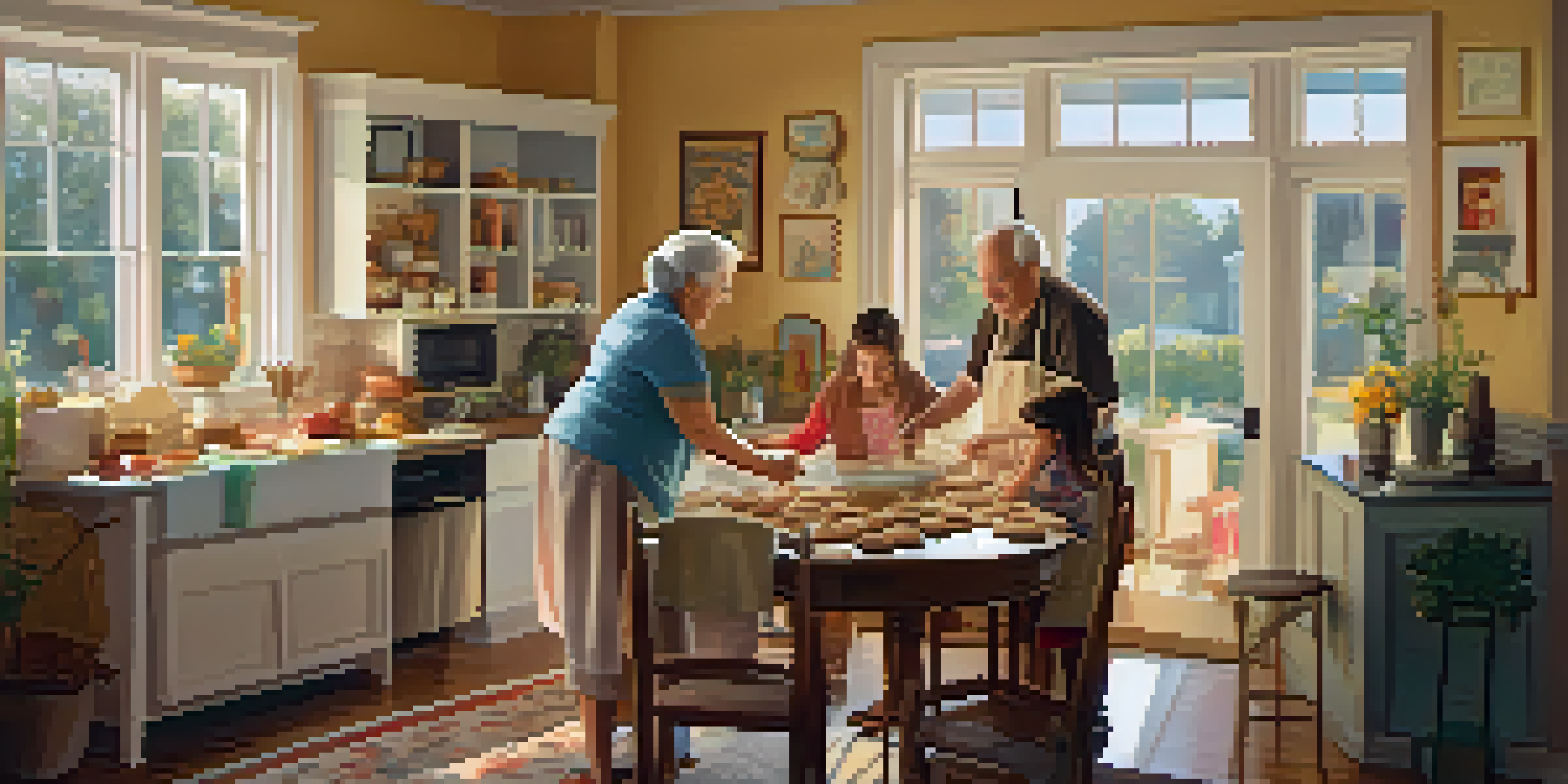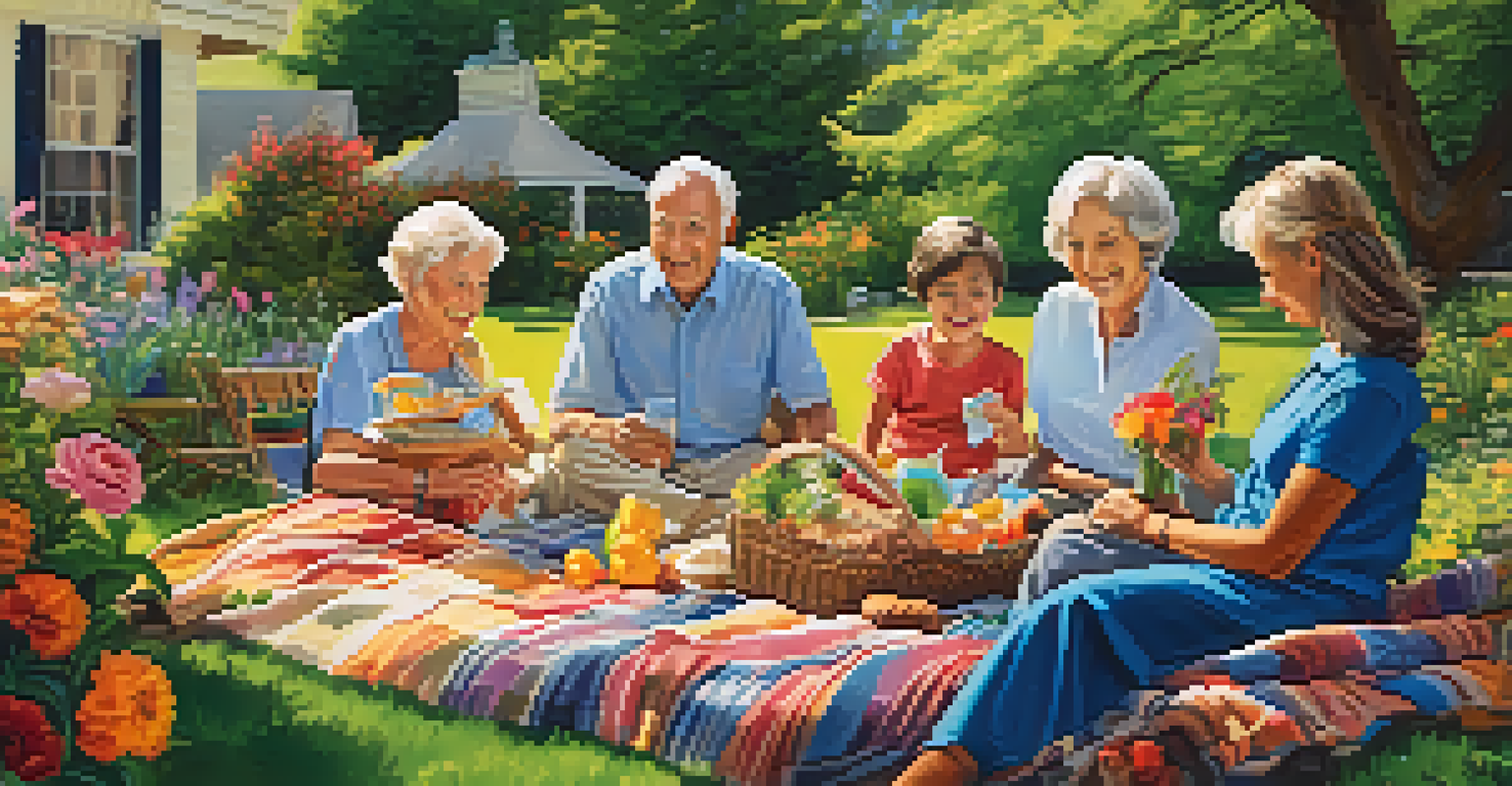The Psychological Benefits of Multi-Generational Living

Strengthening Family Bonds Through Shared Experiences
Multi-generational living fosters deeper family connections by creating shared experiences. When multiple generations reside together, they engage in daily activities, from cooking meals to celebrating holidays, which strengthens their bonds. These shared moments can lead to a sense of belonging and unity, making family members feel more connected and supported.
Family is not an important thing, it's everything.
Moreover, children benefit from the wisdom and guidance of their grandparents or older relatives. This interaction can provide them with valuable life lessons and a sense of security. In turn, older generations find joy and purpose in nurturing the younger ones, creating a reciprocal relationship that enriches everyone's lives.
As families navigate life's challenges together, they develop resilience and a strong support system. This collective approach to problem-solving not only enhances familial relationships but also contributes to each member's emotional well-being, leading to a healthier and happier household.
Enhanced Emotional Support and Mental Well-Being
Living in a multi-generational household often means having a built-in support system. Family members are more readily available to offer emotional support during tough times, which can significantly reduce feelings of loneliness and anxiety. This constant presence can be particularly beneficial for younger adults and aging relatives who may otherwise feel isolated.

In addition, sharing responsibilities such as childcare or household chores can alleviate stress for everyone involved. When tasks are divided among multiple generations, no one person feels overwhelmed, leading to improved mental health. This cooperative environment allows family members to focus on their personal well-being, knowing that they have others to lean on.
Strengthening Family Connections
Multi-generational living fosters deep bonds through shared experiences and emotional support.
Furthermore, emotional support from family can enhance an individual's self-esteem and confidence. When family members feel valued and appreciated, it positively impacts their mental health, encouraging them to thrive both inside and outside the home.
Fostering a Sense of Purpose in Daily Life
Living with family across generations often instills a sense of purpose in individuals, particularly among older adults. Many grandparents find joy in being active participants in their grandchildren's lives, which can lead to increased motivation and satisfaction. This sense of purpose is crucial for maintaining mental health as people age.
The bond that links your true family is not one of blood, but of respect and joy in each other's life.
Younger generations, too, benefit from having older family members around. They gain insights into family history and traditions, which can instill a sense of identity and belonging. This connection to their roots often inspires individuals to contribute positively to the family and community, cultivating purpose.
Additionally, multi-generational living encourages individuals to take on roles and responsibilities that enhance their self-worth. Whether it’s teaching a skill, sharing stories, or helping with childcare, these interactions reinforce a sense of belonging and importance within the family unit.
Promoting Intergenerational Learning and Growth
When different generations live together, they have unique opportunities to learn from one another. Older adults often share their life experiences and wisdom, while younger family members introduce new technologies and ideas. This exchange of knowledge enriches everyone’s lives and fosters mutual respect.
Such intergenerational learning can also enhance critical thinking and problem-solving skills. For example, younger family members might learn patience and resilience from their elders, while older adults can gain new perspectives on modern issues from younger relatives. This dynamic encourages adaptability and growth across all ages.
Promoting Learning and Growth
Living together allows different generations to learn from each other, enhancing skills and perspectives.
As family members share their diverse viewpoints, they cultivate an environment of open-mindedness and creativity. This collaborative spirit can lead to innovative solutions to family challenges and a stronger familial bond, as everyone feels valued for their contributions.
Creating a Safe and Nurturing Environment for Children
Children raised in multi-generational households often enjoy a nurturing and stable environment. With access to multiple caregivers, they receive more attention and support, which is vital for healthy emotional development. This supportive atmosphere fosters security and confidence in children as they grow.
Moreover, having various family members involved in a child's upbringing can expose them to diverse viewpoints and traditions. This exposure helps children develop empathy and adaptability, essential traits in today’s increasingly interconnected world. Such diversity enriches their understanding of relationships and social dynamics.
Additionally, children learn valuable life skills from observing and interacting with their grandparents and other relatives. These lessons can range from cooking and gardening to conflict resolution, equipping them with practical knowledge and emotional intelligence that serves them well throughout life.
Encouraging Healthy Lifestyles and Habits
Multi-generational living can significantly impact health and wellness by encouraging healthier lifestyles. Families that live together often share meals, promoting nutritious eating habits and cooking skills across generations. This collective approach to meal preparation not only boosts physical health but also fosters social bonding.
Exercise routines can also flourish in a multi-generational setting. Whether it’s going for walks, engaging in gardening, or participating in group sports, family members can motivate one another to stay active. This shared commitment to fitness helps everyone maintain a healthier lifestyle while strengthening family ties.
Building Resilience Through Challenges
Navigating conflicts together strengthens family ties and equips members with essential problem-solving skills.
Additionally, living in a supportive environment can reduce stress-related health issues. When family members share their concerns and challenges, they often find relief in knowing they’re not alone. This open communication fosters a holistic approach to health, benefiting both mental and physical well-being.
Navigating Challenges Together for Resilience
Despite the many benefits, multi-generational living can also present challenges, such as differing opinions and lifestyle choices. However, these challenges can be valuable opportunities for growth and resilience. When family members confront and navigate conflicts together, they develop stronger communication skills and a deeper understanding of one another.
Moreover, overcoming challenges as a family can strengthen relationships and build trust. This resilience is crucial in times of crisis, as family members learn to rely on one another for support and solutions. The ability to face difficulties together fosters a sense of unity and determination.

Ultimately, the lessons learned from navigating challenges can help shape family members into adaptable and resourceful individuals. This resilience not only benefits the family unit but also translates into other aspects of life, equipping individuals with the tools to handle future obstacles.